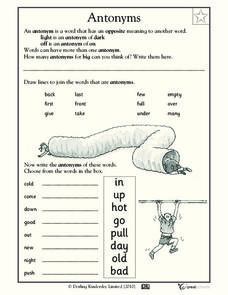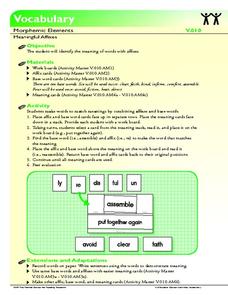Curated OER
Antonyms
Familiarize linguists with antonyms as they examine examples and match up opposites. First, scholars read a short description of antonyms, writing as many antonyms for big as they can. Then, they match up pairs of words that are antonyms...
Curated OER
Homographs
There are eight homograph riddles here: can your scholars figure them out? For each, there are three definitions and a picture. Learners use the picture and multiple meanings as clues, recording a word that matches all three. They read...
Spelling City
Card Flip Game: Synonyms and Antonyms
Match words to their synonyms and antonyms with a card flip game. Kids turn over two cards on their turn and determine if they are synonyms or antonyms; if not, they replace the cards and try again.
Curated OER
Home Living / Daily Living: Safety Terms
Being able to recognize safety signs in your environment is a great start to staying safe. Kids with severe to moderate disabilities work to recognize and identify safety terms and signs. They use flashcards and decreasing prompts to...
Curated OER
Antonyms, synonyms and homophones
Shed light on what antonyms, synonyms, and homophones are. For this lesson, upper elementary schoolers create pairs using an antonym, a homophone, and/or a synonym. Then they play an antonym matching game.
Curated OER
Synonyms and Antonyms
Mix up your writing lessons by having kids look at recent newspaper articles instead of their own work. They work in pairs and rewrite sports news articles using synonyms and antonyms for a set number of words. Then they share their work...
Curated OER
Vocabulary Practice with Present Tense Verbs
Learners determine the meaning of vocabulary in each of eight sentences and select from three possible sentences that have the same meaning expressed differently. A rigorous way to practice vocabulary; more thought is needed than if you...
Curated OER
Choose the Homograph
Practice homographs with this fun worksheet! Learners choose the meanings of ten homographs based on the sentence's context clues. The worksheet has a picture of bats - one flying mammal, and one used in baseball. Use this resource as a...
Curated OER
Vocabulary Packet: Multiple Approaches
Looking for a complete vocabulary and spelling packet focused on high frequency words? Look no further. This printable packet includes six worksheets with activities to reinforce spelling and vocabulary competency. Learners complete a...
San José State University
Possessive Apostrophes
A great review of possesive nouns and how to add apostrophes. Clearly demonstrating where to place the apostrophe for different nouns, the resource also notes some tricky exceptions. Reinforce the concept with a little practice putting...
Arcademics
Furious Frogs
A multiplayer learning game challenges scholars to match words making antonym pairs.
Curated OER
Double Dip: Using Multi-Meaning Words
Double dip ice cream cones are a fourth grade favorite, and now they come in vocabulary and context flavor. Learners practice using double meaning words as they construct ice cream cones that contain two sentences showing how context can...
Curated OER
International Dance Day: Reading and Activities for ELD
A brief passage about International Dance Day, April 29, is accompanied by an array of language activities based in sound ELD practice: cloze exercise, phrase matching, word jumble, multiple choice, sequencing, interview, group...
Florida Center for Reading Research
Vocabulary: Morphemic Elements, Meaningful Affixes
Invite learners to determine which affix and base word combinations create new words. This activity allows pupils to play around and create words that match specific meanings.
Curated OER
Homophones and Homographs
Getting tired of correcting to, two, and too? What about weather and whether? Use a thorough lesson on homophones and homographs to clear up those differences. Fourth and fifth graders identify which words sound the same and are spelled...
Utah Education Network (UEN)
Greek and Latin Roots- Introduction
Improve vocabulary by reviewing Greek and Latin roots with your ELA class! A fun and easy way for your class to memorize roots, groups are given a set of nine roots and nine definition cards which they must then match. Encourage groups...
Macmillan Education
Understanding Poetry (Elementary)
Introduce young readers to poetry analysis with a worksheet that uses Emily Bronte's "Spellbound" to model how poets use word choice, the sounds of words, the repetition of words, and rhyming patterns to create the mood, tone, and...
BBC
The Sound Monster - Words That Make Sounds
There are words in the English language that actually make sounds, such as vroom, and, buzz. Here is a clever lesson plan which introduces young readers to these sound-making words. They play an interactive game on the computer that has...
Curated OER
Vocabulary Words Kindergarten
Improve your kindergartners' math and science vocabulary with flash cards and word walls. Based on the vocabulary in the Common Core standards, the cards use illustrations to show the meanings of many math terms and descriptions.
Curated OER
Cinco De Mayo: ELD Reading and Language-Building
A brief passage about the Mexican holiday Cinco de Mayo is accompanied by an array of language activities for ELD: cloze exercise, phrase matching, word jumble, multiple choice, sequencing, interview, group presentation, fluency writing,...
Curated OER
Learning Opposite Words
Young readers explore words that are opposites. They define "opposites" and complete a worksheet matching words that are opposites. A very basic, but educationally sound lesson plan.
Curated OER
Big Words
Students read the book Big Words and do literacy based activities that are based on the book. In this literacy lesson plan, students read the given book and do activities that include synonym matching, word building, maze finding, mood...
Curated OER
Compound Words
In this compound words worksheet, 2nd graders match words to become compound words and then write the word next to its clue. Students make 3 compound words.
Curated OER
Root Word Practice #1
For this root word practice worksheet, students match 25 prefixes and roots to their meanings. Students place the numbers in the magic squares, and when all the answers are correct all of the columns and rows will add up to the same number.

























